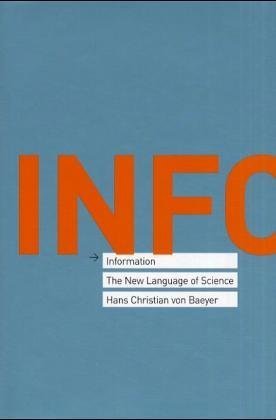What do you think?
Rate this book


Confronting us at every turn, flowing from every imaginable source, information defines our era--and yet what we don't know about it could--and does--fill a book. In this indispensable volume, a primer for the information age, Hans Christian von Baeyer presents a clear description of what information is, how concepts of its measurement, meaning, and transmission evolved, and what its ever-expanding presence portends for the future.
Information is poised to replace matter as the primary stuff of the universe, von Baeyer suggests; it will provide a new basic framework for describing and predicting reality in the twenty-first century. Despite its revolutionary premise, von Baeyer's book is written simply in a straightforward fashion, offering a wonderfully accessible introduction to classical and quantum information. Enlivened with anecdotes from the lives of philosophers, mathematicians, and scientists who have contributed significantly to the field, Information conducts readers from questions of subjectivity inherent in classical information to the blurring of distinctions between computers and what they measure or store in our quantum age. A great advance in our efforts to define and describe the nature of information, the book also marks an important step forward in our ability to exploit information--and, ultimately, to transform the nature of our relationship with the physical universe.
(20040301)Hardcover
First published October 9, 2003
Information, too, has been defined operationally. Unfortunately, this technical, bottom-up definition is very restricted, and hitherto bears little resemblence to any of the common, top-down definitions. Eventually the two definitions should converge, but that hasn't happened yet. When it does, we will finally know what information is.
Zeilinger's principle... furnishes an answer to Wheeler's famous question "Why the quantum?" Why does nature seems granular, discontinuous, quantized into discrete chunks like sand..? The answer is that while we have no idea how the world is really arranged, and shouldn't even ask, we do know that knowledge of the world is information: and since information is naturally quantized into bits, the world also appears quantized. If it didn't, we wouldn't be able to understand it. It's both as simple and as profound as that.
A second prediction of QM that is explained... is the randomness of the outcomes of some measurements... if the single bit of information in an elementary system is revealed, then there is no more information left over to answer additional experimental questions... so other independent measurements must have random answers.
The most important role of noise, however, is as the preserver of our sanity. Without noise, the measurement or observation of a single quantity would requite an infinite memory and an infinite amount of time - it would overload all our circuits. Neither science nor consciousness could exist... noise is a thick blanket of snow which softens the contours into large, rounded mounds we can perceive and sort out without being overwhelmed.